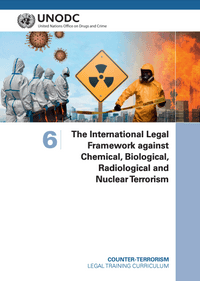
Language: English
The International Legal Framework against Chemical, Biological, Radiological and Nuclear Terrorism
[International Legal Framework against CBRN Terrorism]
This resource reviews the international legal instruments, agreements, protocols, and conventions that deal with national Chemical, Biological, Radiological, and Nuclear (CBRN) counter-terrorism efforts and obligations.
SUMMARY
This resource reviews the international legal instruments, agreements, protocols, and conventions that deal with Chemical, Biological, Radiological, and Nuclear (CBRN) counter-terrorism. The document is intended to be used by national legislative leaders focused on implementing their state’s international obligations concerning the prevention of CBRN terrorism. However, this document may also be of use to other officials involved in counter-terrorism initiatives, including law enforcement officials. The document’s first chapter is devoted to a discussion of legal CBRN counter-terrorism instruments including criminalization, extradition, and prosecution. The next chapter reviews United Nations Security Council resolutions dealing with CBRN counter-terrorism, including United Nations Security Council Resolution 1540. The third and final chapter describes the key features and benefits of several major international counter-terrorism conventions.
This resource is part of the United Nation’s Counter-Terrorism Legal Training Curriculum. The UN is an international organization that has 193 Member States (as of October 2021). The United Nations Office on Drugs and Crime (UNODC) is tasked with providing assistance to the Member States on the legal and criminal justice aspects of counter-terrorism. The Terrorism Prevention Branch of UNODC leads that assistance effort, primarily by aiding in the ratification of international conventions against terrorism, the incorporation of counter-terrorism provisions into national legislation, and strengthening the criminal justice system’s capacity. The Terrorism Prevention Branch developed the six modules within the UN Counter-Terrorism Legal Training Curriculum, including this resource. However, only this resource has been included in the library since the other five do not focus on biological weapons. Like many UN documents, this resource is available in English, Spanish, French, Chinese, Arabic, and Russian.

..png)
